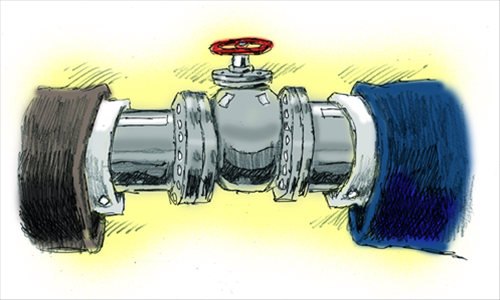Sino-Russian gas deal shows center of gravity has shifted from West

Illustration: Peter C. Espina/GT
The recent deal between Russia and China on the delivery of natural gas was precast by confusion and obfuscation. After a decade of tough negotiations, the meeting between Russian President Vladimir Putin and Chinese President Xi Jinping amid the stand-off between Russia and the US and the EU over Ukraine could not have come at a better moment, for Russia.
When initial reports filtered in that there was in fact no deal, policymakers in Brussels and Washington raised their glasses, only to wake up and find that the deal had in actuality been consummated.
Full contract terms have not been announced, and most likely will not. What we do know is that the total deal is worth $400 billion, and encompasses the annual delivery of 38 billion cubic meters of natural gas per year for a period of 30 years, starting in 2018.
Analysts estimate that the price paid by China for delivery to its border is about $10-11 per million British thermal units (mmBtu). In comparison, European prices vary between $10-12/mmBtu.
With a delivered price to Shanghai of around $12/mmBtu, the Chinese have locked in a price which is very competitive with Asian spot prices for liquefied natural gas (LNG) that currently stand at a 19-month low of $13.30/mmBtu.
It is worth keeping in mind that this new Russian pipeline will only supply China with approximately 10 percent of their expected natural gas demand. However, locking up this volume of gas with more pipeline gas and LNG from Russia and other sources down the road will help China back out coal and improve air quality.
Many details of the agreement may remain opaque to make a reasonable assessment of its economics, but do these details matter from a US/EU standpoint? We think not.
The fact that Russia and China have found each other emphasizes that the gravity of energy demand no longer lies in the transatlantic space.
Asia is the new locus of global energy demand, whereas demand in Europe and the US is projected to be flat or declining over the next decade.
Russia knows that it will remain the dominant gas supplier to Europe unless European leaders decide that to reduce their dependency they are willing to pay 30 percent more.
Clearly the consummation of the deal with China was a master stroke for Russia as well as China. The agreement fits in a long-term Russian strategy to find alternative growth markets to Europe. Beijing reiterated its pragmatism regarding access to resources, and confirmed its long-standing support for noninterference.
The timing could not have been better. As the US and the EU anxiously await to see whether the sanctions imposed on Putin's inner circle have any effect, Europe remained essentially unwilling to respond to Putin's aggression out of understandable concern of substantial economic harm.
This created a context in which China and Russia could overcome the last hurdles in what had been tough negotiations.
And, unintentionally adding some salt to the wounds, in late May, most major international oil companies were present at the St. Petersburg International Economic Forum, where new exploration contracts with Russian firm Rosneft were signed, because it is believed that sometime after the turmoil in Ukraine is over, exploration for Arctic resources will continue.
The US and Europe have been reminded they are part of increasingly global markets. As energy demand shifts, so does political clout.
In an economy that unfortunately continues to depend overly on fossil fuels, the idea that one could isolate the world's largest hydrocarbon producer was never realistic.
Charles Ebinger is a senior fellow and director and Tim Boersma is a fellow of the Energy Security Initiative at the Brookings Institution. opinion@globaltimes.com.cn